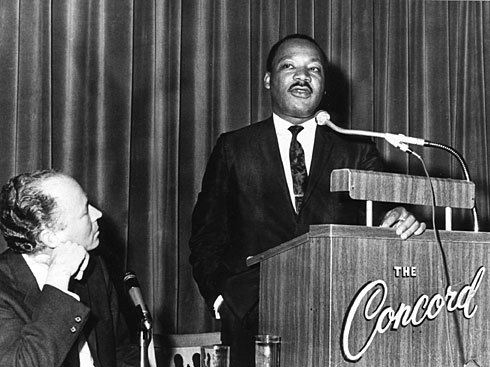We are pleased to cast a spotlight this week on Jewish Civil Rights Activist Rabbi Everett Gendler, who is featured in the documentary Shared Legacies: The African-American Jewish Civil Rights Alliance, that is being virtually screened beginning this weekend through the Buffalo International Jewish Film Festival. Shared Legacies explores the crucial historic lessons of Black-Jewish cooperation during the Civil Rights era. On Tuesday, May 4th, the film festival will hold a “Talkback” let by Temple Beth Tzedek’s Rabbi Adam Rosenbaum and a panel including Rabbi Everett Gendler. Click here for details.
The following are segments of a recent interview with Rabbi Gendler by Buffalonian and family member, Gail Gendler, daughter of Charlotte Gendler and Alan Gendler z”l. The full interview can be found on pages 20-21 in the May issue of the Jewish Journal of Western New York (Click here to read it on line).
* * *
When did you start working with the Civil Rights movement?
I started working at my first congregation in Princeton, NJ in 1962 (after graduating from Jewish Theological Seminary-JTS). A rabbi colleague phoned and said, “Everett, King (Rev. Martin Luther King) really hit some roadblocks in Albany (GA) and he’s hoping that some Northern clergy can come participate in a prayer vigil. It might help boost the movement.” Obviously, King’s approach of non-violence, active, engaged, prophetic justice and, reliving the exodus from Egypt, had intrinsic appeal to me.
I realized that the timing for this sort of venture is never convenient. I asked the question ‘Do you put your feet and body where your mouth has been, or do you take refuge in inconvenience? ‘I simply felt moved to risk, so I went.
What was your relationship like with Rabbi Abraham Joshua Heschel z”l?
Rabbi Heschel was one of my teachers at the Seminary (JTS). He was certainly an inspirational figure; he had a profound influence on me. I was fortunate enough to have contact with him throughout my studies at the Seminary and afterwards.
Historians mention that I persuaded Heschel to go to Selma for the famous, triumphant march. That should be qualified. There was no need to persuade him to go; he had a deep instinct, a deep identification with King and the freedom movement. He did ask me if I thought it was responsible, how much danger was there for him, as he and his wife, Sylvia had a young daughter.
What can the Jewish community and their allies do to foster and include others in the struggle for civil rights today?
For the astonishing progress that followed the Civil Rights movement, we (still) need the kind of vision that King provided. We need the shared values, the affirmation of the dignity of all human beings, the emphasis on all that we, as Americans. We need to articulate that, not just through words but through engagement; we need to address them together. Our best chances for moving forward is to find commonality and not just trading favors for advancement for one group or another.
What is needed to create more unity in civil rights work today?
We need to engage in clarification of what our vision is… of the future. It is not clear at this point, at least not clear to me, exactly what various groups want. The people who want to broaden our cultural sensitivities have a very important point and of course, other points of view have to be included. On what basis is there this inclusion? We recognize that our differences have to be acknowledged and celebrated. But let us also identify human elements that all of us share. We have more in common than divides us. We have to find a way to recognize that distinctive need not mean divisiveness.

Rabbi Everett Gendler looking at MLK Jr. who spoke at the Rabbinic Assembly at the Concord in honor of Rabbi Joshua Heschel’s 60th birthday in March 1968. King was assassinated 10 days later.
